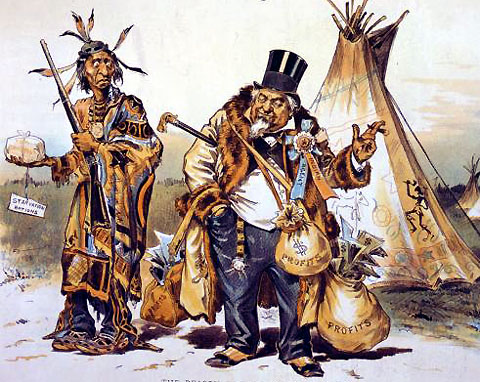by Gordon Y.K. Pang and Dennis Camire of The Honolulu Advertiser
A bill that could pave the way toward federal recognition for Native Hawaiians took a key step forward yesterday by winning approval from the U.S. House of Representatives.But it was a decidedly small step, with a bigger fight expected in the Senate, where the bill has stalled since it was first introduced in 2000.
After failing to make it out of the last two-year legislative cycle that ended in December 2006, the bill is now essentially where it was then, with an OK from the House but no vote scheduled for the Senate.
|
And formidable opposition lies ahead, including a likely veto by President Bush if the measure is approved by the Senate.
Both supporters and opponents of the legislation, nicknamed the Akaka bill after Sen. Daniel Akaka, D-Hawai'i, took heart from yesterday's vote.
Clyde Namu'o, administrator of the Office of Hawaiian Affairs, said the House approval gives impetus to senators to do what their colleagues have done.
"We believe that having the bill move out of the House provides momentum for the Senate to take this up," Namu'o said.
H. William Burgess, whose group Aloha For All opposes federal recognition and Hawaiians-only programs on the grounds that they discriminate against other races, said he's encouraged by the vote.
If the bill moves out of the Senate, there do not appear to be the 290 out of 435 votes necessary to override a presidential veto.
"Hopefully, this bill doesn't make it to the president and ends up in the trash can where it belongs," Burgess said.
He added that he believes yesterday's vote was a wake-up call for those who oppose federal recognition. "It will now galvanize those people who oppose the bill to now believe, that as absurd as it is, this bill may actually pass," he said.
The current legislative cycle ends in December 2008 and any action must conclude by then or start over again in a new session.
The House voted 261-153 to approve the bill after spirited testimony.
U.S. Rep. Mazie Hirono, D-Hawai'i, a sponsor of the bill, said Native Hawaiians, like Native Americans and Alaska Natives, have an inherent sovereignty based on their status as indigenous native people that was lost when the Kingdom of Hawai'i was overthrown in 1893.
"This is a historic vote and one that helps to perpetuate righteousness by righting a historic wrong," she said.
But Rep. Lynn Westmoreland, R-Ga., said the bill undermines the idea that the United States is one nation that has come from many people.
"The legislation is divisive and would give a group of United States citizens special rights over other citizens based solely on race," he said. "Our Constitution seeks to eliminate racial separation, not promote it."
In a statement, House Minority Leader John Boehner, R-Ohio, said granting broad governmental powers to an exclusive group based on race "is simply unconstitutional."
"This kind of divisive proposition is precisely what our Founding Fathers crafted the Constitution to prevent," he said.
FOR SOME, A FIRST STEP
The highly charged debate revolves around the issue of what, if anything, Native Hawaiians are owed as a result of the Islands' annexation to the United States.
Supporters of the Akaka bill say it's the first step in correcting historic injustices done to Native Hawaiians by the U.S. government and is necessary to protect Hawaiians-only programs.
Some opponents believe federal recognition grants too many powers to a Hawaiian entity at the expense of non-Hawaiians. A segment of Hawaiians opposes federal recognition because they don't feel it goes far enough.
The bill, which the House approved once before in 2000, creates a process for establishing a Native Hawaiian government, including the development of a roll of Native Hawaiians and the election of an interim governing council.
The council would develop the documents on which the government would be based.
Once the United States recognizes the new government, negotiations would take place on the disposition of Native Hawaiian land, natural resources and other assets.
U.S. Rep. Neil Abercrombie, D-Hawai'i, also a sponsor of the bill, told House members the bill was only enabling legislation, not a final resolution on its own.
"This creates the opportunity for Native Hawaiians to take responsibility for their own actions with regard to the control and administration of their own assets," he said.
But in a statement of administration policy on Monday, the White House Office of Management and Budget said the bill was "divisive" and discriminatory.
The statement said the bill would "divide the governing institutions of this country by race" and raise "significant constitutional concerns."
"If (the bill) were presented to the president, his senior advisers would recommend that he veto the bill," the statement said.
Namu'o said OHA was not surprised by the Bush administration's statement, noting that it had been provided with a draft in advance.
"We are still hopeful that (Gov. Linda Lingle, a Republican) will be able to convince the president that this legislation is good for Hawaiians (and) good for Hawai'i," he said.
BIG HURDLES AHEAD
Despite supporters' enthusiasm, major obstacles facing the bill's enactment into law remain, not the least of which is the possible presidential veto.
The Senate Indian Affairs Committee passed the bill in the spring, but no floor action has been scheduled yet.
Akaka said he and other supporters are working to bring it to the Senate floor as soon as possible.
"Today's House action provides great momentum in our effort," Akaka said. "I was thrilled to see bipartisan support for this long-needed legislation that underscores our ongoing efforts toward reconciliation across our Islands."
U.S. Sen. Daniel K. Inouye, D-Hawai'i, co-sponsor of the bill, said he was pleased with House approval of the bill. "House passage gives added momentum to this important measure," he said.
But expected Republican opposition in the Senate means leadership would have to make time for lengthy debate in an already clogged legislative calendar.
A taller hurdle would be a Bush veto, which now seems more certain if the bill makes it to the president's desk.
BILL 'A CLEAR THREAT'
A veto override requires a two-thirds majority in both the House and the Senate, an unlikely prospect given that none of Bush's vetoes has been overcome so far.
Even Abercrombie has said supporters "don't have the votes" to do that. Inouye has said it would be "hairy at best."
Haunani Apoliona, OHA chairwoman, called House passage of the bill "marvelous."
"We are anxious to get it acted on in the Senate," she said. "We expect some of the same rhetoric on the floor of the House today to surface in the Senate, but it's rhetoric that is not accurate. It's misinformation."
Joe A. Garcia, president of the National Congress of American Indians, said allowing a Native Hawaiian government is a matter of fundamental fairness.
"Like American Indians and Alaska Natives, Native Hawaiians deserve the right to determine their own future," he said.
A spokesman for Hui Pu, an umbrella group of Hawaiian organizations opposed to federal recognition, said he was disappointed but not surprised by the House vote.
Hui Pu member Ikaika Hussey said millions of dollars spent by OHA on "lobbyists and chocolate-covered macadamia nuts" paid off.
Hussey said the Akaka bill remains "a clear threat to the movement for self-determination" and that Hui Pu members will be meeting to decide their next move.
Hussey encouraged Congress to hold legislative hearings on the issue in Hawai'i.
Bumpy Kanahele, head of the group Nation of Hawai'i, also called for local hearings.
"If we're going to present something to the U.S. government, it should be something we're all a part of," Kanahele said. What's currently before Congress is "a desperate attempt by the U.S. congressional delegation in Hawai'i to settle all future claims." |

